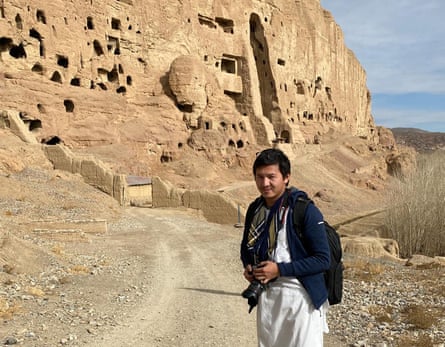Mortaza Behboudi, an Afghan-French journalist, had been drawn back to Afghanistan, which he had left aged 21, to report on the deteriorating humanitarian conditions and situation for women.
“He has a passion to give voice to people who had their voices taken from them, which is why he went back to Afghanistan,” says Aleksandra Mostovaja, Behboudi’s wife.
“He felt it was so important that he should be there, not only because he knew the language, the history, its culture, but also because any story on Afghanistan without perspective of its people will not be complete.”

But on 7 January, two days after he had arrived in Kabul and before he could even begin his work, Behboudi, a French national of Afghan origin, was arrested by the Taliban. Mostovaja has spoken to him just once since – a short phone call in the presence of the Taliban – on 26 January.
“His voice sounded very bad, like he was about to cry and that has made me very worried [abut his condition]. The Taliban have not told us officially why he was arrested, but sources told us that he might be accused of spying, which just isn’t true,” she says.
Mostovaja believes his reporting may have been a reason for his detention. “Some journalists told us that they [the Taliban] make such arrests as a warning to others about what they can do to those who report against them,” she adds.
Since taking over Afghanistan in August 2021, the Taliban have repeatedly targeted journalists. Faced with threats to their lives and increasing restrictions on their work, particularly against women, many are being forced into exile. About one-third of Afghanistan’s journalists have since left the country, with 318 of the 623 media outlets registered in 33 Afghan provinces shutting down, according to one estimate last year.
Several journalists that spoke to the Guardian shared testimonies of threats, attacks, unlawful detention and extortion.
Attacks on journalists in Afghanistan are not limited to the Taliban. Mohammad Sahil*, a 28-year-old Afghan reporter, survived an Islamic State bomb attack in March at an event to honour local journalists at the Tebyan cultural centre in the northern Afghan city of Mazar-i-Sharif.
“Everything went dark, and I lost consciousness for a few minutes. When I opened my eyes, blood was flowing at the back of my neck and my eyes were filled with smoke and dirt. All my colleagues were lying broken and bloodied around me,” he says.
Read full story on The Guardian
